Supporting Mental Health in the Workplace: A Guide for Managers
Managing mental health in the workplace is vital for employee wellbeing. However, it's an ongoing process which doesn’t have an instant fix – it needs be championed by senior leaders and managers but also with forward-thinking training initiatives and continuing support.
In this article we are going to explore how to address mental health issues in the workplace, a manager’s impact on mental health and how to improve employee wellbeing.
Why is it important to talk about mental health?
The discourse surrounding managing mental health in the workplace has surged in recent times, with an inundation of statistics highlighting the prevalence of stress, depression and anxiety in the UK workforce.
Recent data reveals that one in five workers in the UK needed to take time off work in the past year due to poor mental health caused by pressure or stress. This issue carries significant economic ramifications, with work-related stress costing the UK economy a staggering £28bn a year. Despite these ongoing reports in the media, many organisations are not being proactive in their approach to addressing mental health issues.
Talking about mental health in the workplace can be daunting, but with 41% of employers expecting to see increased demand for mental health support this year, it is a conversation that needs to be had. Whether this is by offering training, providing counselling services or by giving the opportunity to talk openly, there are plenty of ways for employers to provide support to the workforce.
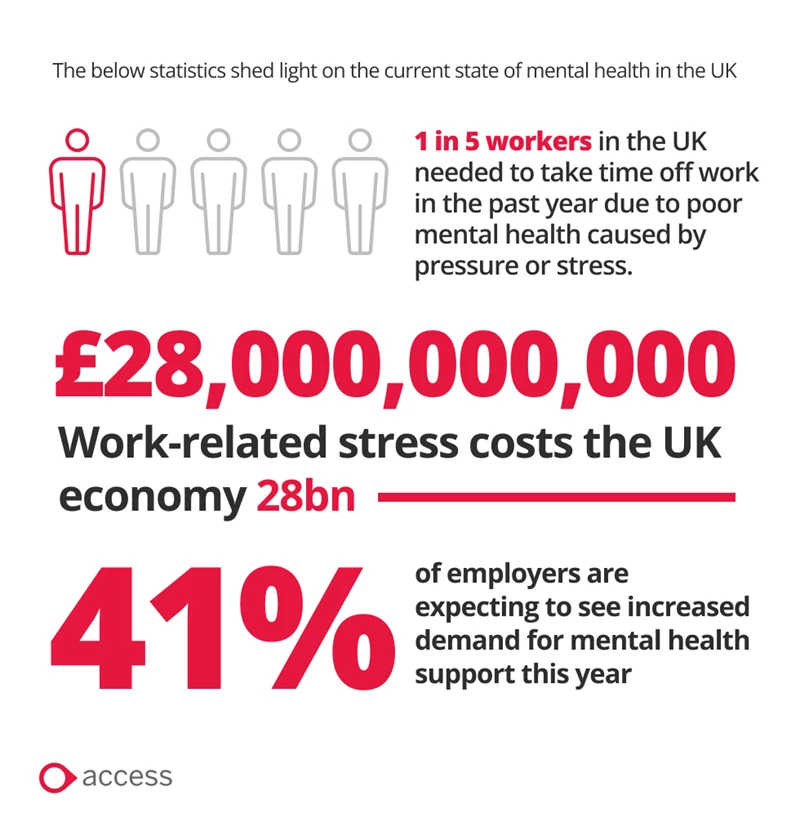
How to support an employee with mental health issues: Identifying triggers
Identifying workplace stress triggers is essential in developing effective strategies for intervention and understanding how to support an employee with mental health issues.
These triggers may include:
• Change in job roles
• A lack of work/life balance
• Harassment or discrimination
• Organisation restructuring
• Unrealistic targets and deadlines
• Stress and burnout
• Impact of remote working
By pinpointing these triggers, employers can proactively create a more enjoyable work environment. For instance, recognising that a change in job roles may cause anxiety for certain individuals could prompt management to offer additional training or support during transitions. Understanding and addressing these triggers can significantly enhance workplace wellbeing and help with creating a mentally healthy workplace.
What's the difference between mental health and wellbeing?
When discussing the topic of supporting mental health in the workplace, it’s important to note the difference between mental health and wellbeing. While they share characteristics, there is a fundamental difference between the two terms and understanding these nuances is key to getting it right.
The term mental health refers to the emotional and psychological state of an individual. Everybody falls on a spectrum of mental health and the concept forms how a person thinks, feels and acts - mental health should be looked after just like physical health.
Wellbeing is a broader concept and while it includes mental health, it looks at the state of being happy and healthy on a daily basis. It also involves physical health, social connections, sense of purpose, environmental factors, and overall life satisfaction.
In summary, mental health focuses on an individual's mental state whereas wellbeing looks at a holistic view of their overall life experience.
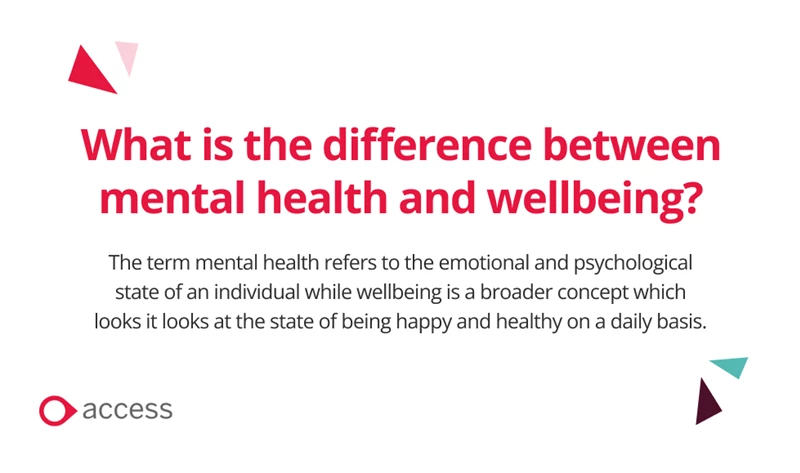
Addressing mental health issues: The role of leaders
Managers play a critical role in the culture of a company – and the behaviour of managers will often set an example to the entire workforce and influence many others within the organisation. This is why managers should understand the importance of supporting mental health in the workplace and actively work towards making positive changes.
The CIPD’s Importance of People management report sheds light on the significant impact managerial behaviour can have on employee mental health. According to the report, workload and management style were two of the most common reasons for stress-related absence. This shows just how crucial it is for those in leadership positions to understand a manager’s impact on mental health and how their roles can influence it on a very personal level.
It’s also essential to discuss the strain many managers face with their own mental health and wellbeing – the pressure that often comes with leadership roles can’t be ignored. In fact, reports have shown that managers are more likely to be diagnosed with a mental health condition than other employees, possibly due to the increased stress and workload associated with leadership roles.
This underscores the importance of destigmatising discussions around burnout, stress, financial concerns, and other factors affecting mental health, irrespective of one's position within the organisation. Recognising and addressing these issues collectively can contribute to a healthier and more supportive work environment for all employees.
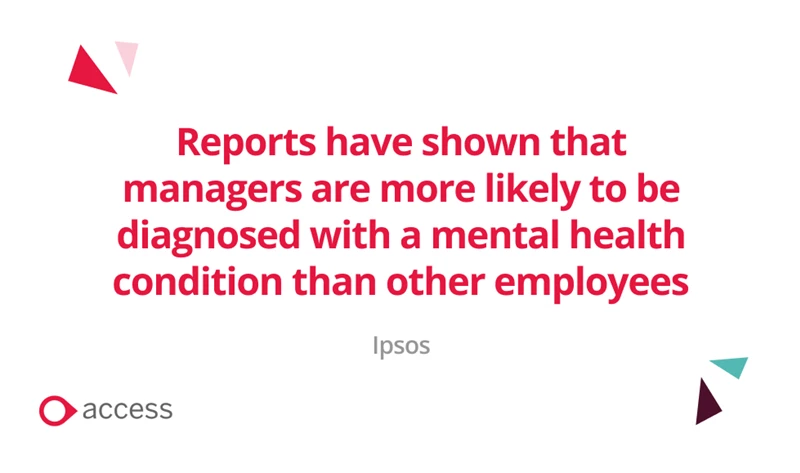
The importance of mental health training for managers: Creating a Safe and Supportive Environment
Mental health training for managers goes beyond simply identifying and addressing mental health issues in the workforce; it embodies a commitment to creating a safe and supportive environment where employees feel valued, understood and listened to. By investing in mental health training for managers, you can:
- Identify early signs of mental health issues in the workforce and provide the appropriate support
- Implement relevant mental health policies which is strongly recommended by the HSE
- Reduce stigma around the topic of mental health
- Improve wellbeing from the top-down
- Reduce unplanned absenteeism and costs associated with it
Providing your managers with a range of mental health and wellbeing courses will help equip them with the tools they need to have conversations surrounding managing mental health at work and start putting processes in place from an organisational perspective. Common topics covered within mental health and wellbeing training include employee resilience, stress management, managing emotions and health and wellbeing at work.
Having the right soft skills can also help leaders support the mental health challenges faced by their employees and teams. Soft skills such as empathy, problem-solving and integrity will help shape important conversations and create supportive managers who can pave the way for addressing mental health issues.
Implementing mental health policies
It's strongly recommended and encouraged by the government and the Health & Safety Executive (HSE) that all organisations should have mental health policies in place and provide training and awareness to all employees.
Where mental health issues are related to recognised illness and disability in law, having a policy in place is a legal obligation. An example of this is if the illness or disability that has an impact on mental health is covered within the Employee Act or Equality Act (or other related Act.)
This is covered in more detail on the HSE website looking at stress and mental health at work.
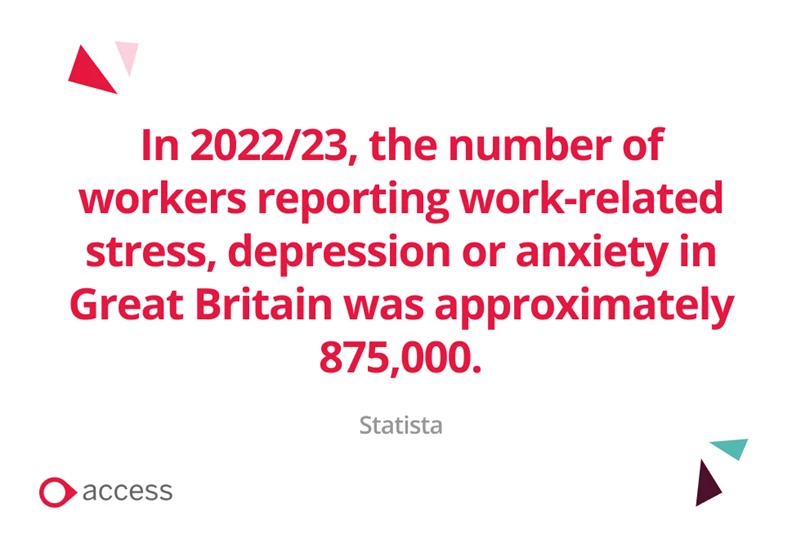
How to improve employee wellbeing: Overcoming challenges and obstacles
In 2022/23, the number of workers reporting work-related stress, depression or anxiety in Great Britain was approximately 875,000. While this figure has reduced from the previous year, it’s still very high.
If organisations are not introducing suitable measures to provide robust employee mental health support, these figures won't improve. Below are 5 clear strategies that your organisation should be implementing to support mental health in the workplace:
1. Introduce training initiatives
Providing managers with mental health and wellbeing training will give them the tools they need to create an environment of openness, trust and confidentiality.
This will encourage employees to approach them about topics that may not be easy to discuss, whilst also providing them with tangible ways to support their own mental health as and when they need it.
Our Mental Health and Wellbeing catalogue includes titles such as:
- Let’s talk about Mental Health
- Psychological Safety
- Avoiding Burnout
2. Ensure flexibility and inclusivity
Promoting flexibility in work arrangements and fostering an inclusive environment are essential for supporting employees' mental health. This could include offering remote or hybrid work options, accommodations for those with personal responsibilities outside of work or ensuring work-life balance measures are put in place.
From an inclusivity perspective, understanding that not everybody learns in the same way and some people may need adjustments will help to create a culture of support.
3. Instigate open communication
Encouraging open dialogues stands out as a simple yet effective approach. By having transparent communication and establishing a feeling of psychological safety, managers can cultivate strong working relationships, which have been shown to correlate with higher job satisfaction among employees.
Inviting regular check-ins with your employees where the topic of wellbeing is discussed will help to create an open-door policy.
4. Provide the right resources
There is an abundance of resources available on the topic of managing mental health in the workplace and addressing mental health issues, but employees may not know where to look for it or feel comfortable initiating conversations surrounding accessing them.
Having a central hub which signposts helpful content will ensure your employees can get the information they need.
Below are some resources we have available through our self-directed learning platform Bookboon:
- Mental Health at Work
- A CEO’s Guide to Mental Health and Stress at Work
- Business Approach to Mental Health and Well Being
5. Utilise Employee Assistance Programmes
In some cases, it won’t always be possible for a manager to step in and help the employee directly, which is where employee benefits such as an Employee Assistance Programme, or EAP, may be a suitable alternative. Providing confidential support to your employees that they can access immediately will show your commitment to the mental health and wellbeing of your employees.
While these five strategies are not an exhaustive list and you may wish to implement other methods depending on the needs of your company and workforce, they serve as foundational steps for organisations to support mental health in the workplace.
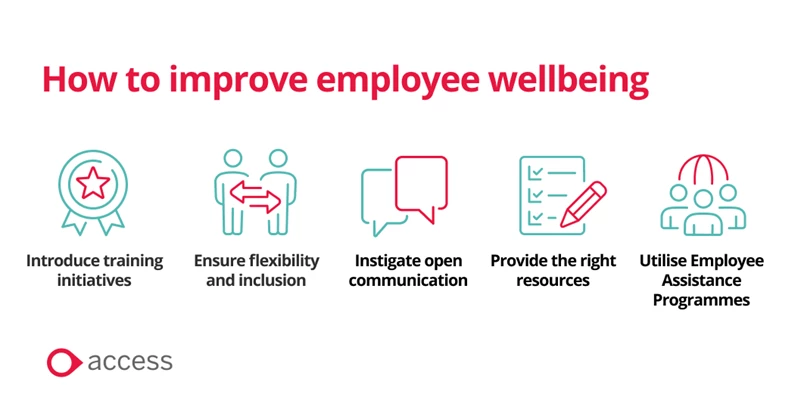
Managing mental health: A summary
As we have covered within this article, there really is no better time to manage mental health in the workplace. The topic of employee mental health support needs to be handled carefully, but managers and employers must be able to have open conversations about the topic to offer employee mental health support, as well as receive training themselves.
Let Access Learning help boost mental wellbeing across your organisation.
Our Mental Health and Wellbeing eLearning catalogue contains a range of engaging and helpful training content and tools to help create a culture of awareness and understanding across your organisation.
Alternatively, you can chat with one of our learning experts and find out how our Mental Health training can fit the exact needs of your organisation.
About the author
Emma Parnell is Product Manager for Access eLearning content and has been at The Access Group for over five years. With an impressive 22-year tenure in the learning and development community, Emma is deeply committed to driving change through the creation of insightful, credible, and engaging learning experiences.



